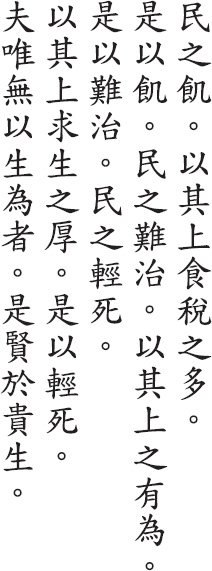75
 |
The reason people are hungry is that those above levy so many taxes this is why they are hungry the reason people are hard to rule is that those above are so forceful this is why they are hard to rule the reason people think little of death is that those above think so much of life this is why they think little of death meanwhile those who do nothing to live are more esteemed than those who love life |
DUKE AI approached YU JUO: “The year is one of famine, and my revenues are wanting. What am I to do?” Yu Juo replied, “Return to the 10 percent rate of taxation.” Duke Ai said, “But I cannot get by on 20 percent. How will I survive on 10 percent?” Yu Juo replied, “When the people don’t want, why should the ruler want. When the people want, why should the ruler not want?” (Lunyu: 12.9).
WANG PI says, “The people hide and disorder prevails because of those above, not because of those below. The people follow those above.”
LI HSI-CHAI says, “If those above take too much, those below will be impoverished. If those above use too much force, those below will rebel. This is a matter of course. When people think their own life is more important, and they disregard the lives of others, why should others not treat death lightly? Sages don’t think about life unless they are forced to.”
TE-CH’ING says, “Robbers and thieves arise from hunger and cold. If people are hungry and have no means to live, they have no choice but to steal. When people steal, it’s because those above force them. They force people to turn to stealing and then try to rule with cleverness and laws. But the more laws they make, the more thieves appear. Even the threat of the executioner’s ax doesn’t frighten them. And the reason people aren’t frightened by death is that those above are so concerned with life.”
SU CH’E says, “When those above use force to lead the people, the people respond with force. Thus do complications multiply and the people become hard to rule.”
WANG CHEN says, “‘Forceful’ refers to the ruler’s love of might and arms. But once arms prevail, disorder is certain.”
HUAI-NAN-TZU says, “The reason people cannot live out their allotted years and are sentenced to death in midlife is that they think so much of life. Meanwhile, those who do nothing to stay alive are able to lengthen their lives” (Huainantzu: 7).
HO-SHANG KUNG says, “Only those who do nothing to stay alive, who aren’t moved by titles or sinecures, who aren’t affected by wealth or advantages, who refuse to serve the emperor or run errands for lesser lords — they alone are more esteemed than those who love life.”
YEN TSUN says, “The Natural Way always turns things upside down. What has no body lives. What has a body dies. To be alive and to seek advantages is the beginning of death. Not to be alive and to get rid of advantages is the beginning of life. Those who don’t work to live live long.”
WANG TAO says, “The meaning of the last two lines is: If I didn’t have this body of mine, what worries would I have?”
WANG P’ANG says, “If you understand only one of these three, you can understand the other two.”
In line eight, I have followed the Fuyi edition in reading ch’i-shang (those above). Other editions have simply ch’i (those), leaving the referent in doubt. This verse is not present in the Kuotien texts.